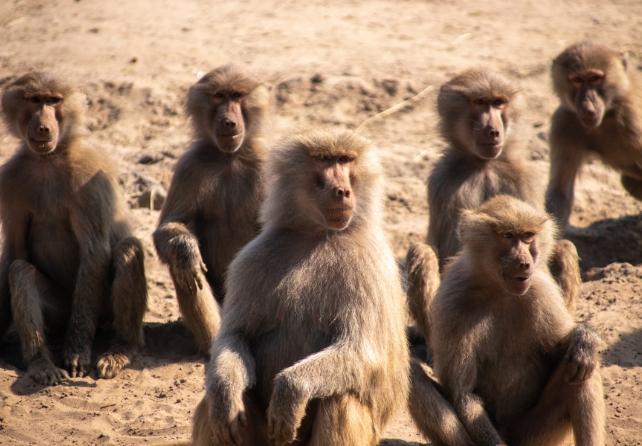All of us needed to make changes because the COVID-19 pandemic unfolded – even zoo animals who have been immediately not seeing crowds of tourists move by each single day.
In a research printed in 2022, researchers found how primates reacted to that shift, trying on the habits of bonobos, chimpanzees, western lowland gorillas, and olive baboons, and discovering that the animals modified their habits in quite a lot of methods, together with the period of time they spent resting and consuming.
Customer interactions are considered essential to the welfare of zoo animals. But these interactions have the potential to be both optimistic or unfavorable. So the researchers have been eager to see the distinction when the crowds weren’t there.
“Primates are some of the most cognitively advanced species in zoos and their interactions with visitors are complex,” zoo animal welfare scientist Samantha Ward from Nottingham Trent College within the UK defined on the time.
“A limitation to understanding how visitors can affect behavior of animals in zoos and parks is that they rarely close to the public for prolonged periods, so this provided us with a unique opportunity.”
Observations have been recorded at Twycross Zoo and Knowsley Safari within the UK, each earlier than and after guests returned.
Over a number of months and a number of open and closure durations, there have been noticeable adjustments in primate habits, which diversified relying on the animal.
As guests started to return to the zoo, the bonobos and gorillas spent much less time alone, whereas the gorillas additionally spent much less time resting. Chimpanzees, in the meantime, have been consuming extra and fascinating with their enclosures extra when zoos reopened.
The olive baboons within the safari park have been seen to have interaction in much less sexual and dominance habits when the guests got here again. In addition they tended to strategy customer automobiles extra usually, in contrast with the ranger autos they noticed when the park was closed.

Whether or not or not these adjustments have been optimistic is tougher to say.
The researchers recommend that the returning guests appeared to stimulate the chimpanzees and baboons, whereas gorillas and bonobos spending much less time alone may be seen as optimistic.
On the similar time, it could possibly be argued that gorillas – naturally extra sedentary animals – have been disrupted by the crowds in that they spent much less time resting.
That the gorillas modified the components of their enclosures they spent essentially the most time in when guests got here again means that the animals can to some extent handle this disruption.
“Behavioral changes and changes in enclosure use in the presence of visitors highlights the adaptability of zoo species to their environments,” mentioned zoo animal welfare researcher Ellen Williams from Harper Adams College within the UK.
“Provision of environments which enable animals to actively adapt in this manner is really important for their welfare.”
The staff additionally noticed that there was a customer quantity threshold when it got here to olive baboons, past which the animals stopped turning into more and more lively and stimulated by the passing automobiles within the safari park.
That is all beneficial information for animal welfare researchers, who know that guests can have all types of results on wildlife – from including emotions of companionship and security, to being sources of annoyance and even threats. This must be factored into how zoos and parks are run and designed.
Whereas there won’t be any extra lockdowns within the foreseeable future (hopefully), the analysis staff desires to proceed the work of finding out how customer numbers have an effect on animal habits, together with accumulating information involving extra animals and throughout an extended time scale.
“Future work could involve looking at the impact on a wider range of species in both zoos and safari parks as well as differences among individual animals,” mentioned Williams.
The analysis was printed in Animals.
An earlier model of this text was printed in September 2022.

